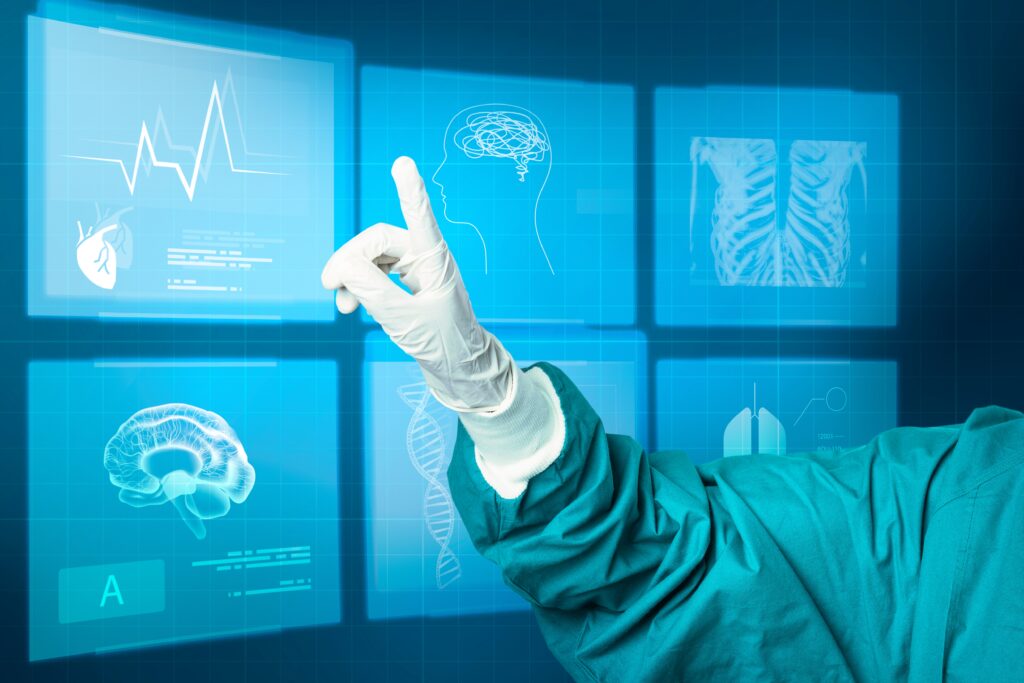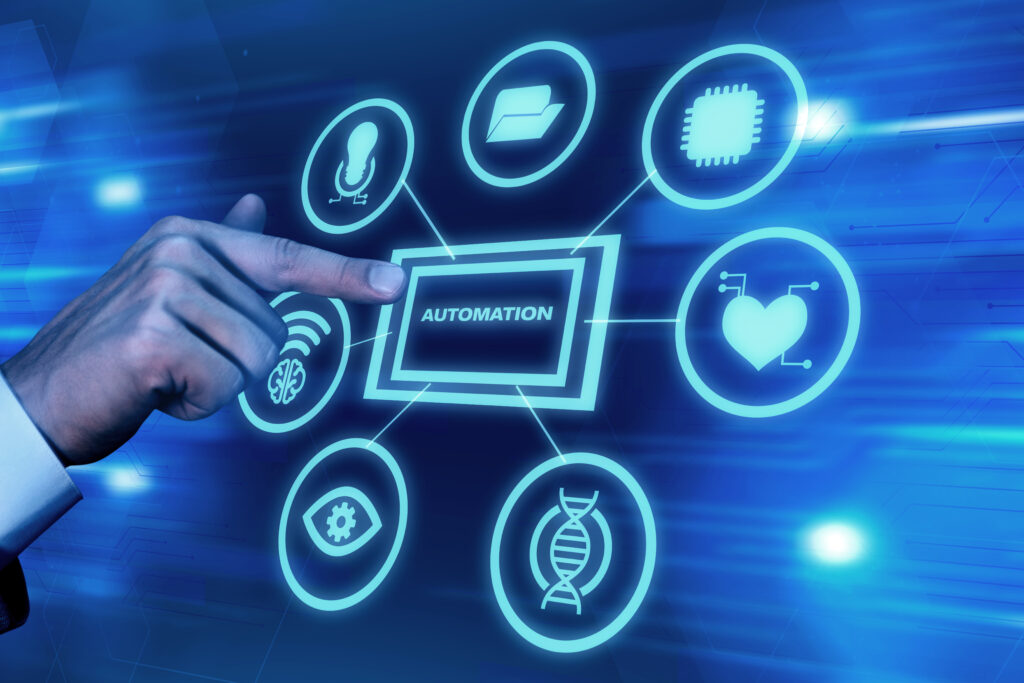Machine learning in healthcare transforms patient care by analyzing data for better diagnostics, personalized treatments, and outcome predictions. This article covers its key applications and real-world impact.
Key Takeaways
-Machine learning enhances healthcare by improving diagnostics, personalizing medicine, and providing predictive analytics, ultimately leading to better patient outcomes.
-The integration of machine learning into electronic health records streamlines operations and improves resource allocation, allowing healthcare professionals to focus more on patient care.
-Despite its benefits, machine learning in healthcare raises ethical concerns, including data privacy, consent, and the potential for widening social inequalities.
Understanding Machine Learning in Healthcare

Machine learning is a subset of artificial intelligence that focuses on developing algorithms capable of learning from data and improving their performance without being explicitly programmed. This is achieved by detecting patterns in data and making predictions or decisions based on those patterns. In healthcare, machine learning algorithms analyze vast amounts of patient data, enabling healthcare professionals to gain insights that were previously unattainable through artificial neural network techniques.
The application of ml healthcare applications spans various areas, from diagnostics to treatment planning and beyond. As patient data becomes more readily available, machine learning helps extract meaningful information, leading to improved patient outcomes. This transformative technology enhances data analysis, which is crucial for managing patient data effectively.
One of the key benefits of machine learning in healthcare is its ability to improve patient outcomes while reducing healthcare costs. Machine learning models enable healthcare providers to deliver more accurate diagnoses, personalized treatment plans, and predictive analytics in healthcare, all contributing to better patient care. This not only enhances the quality of care but also streamlines healthcare delivery and reduces the burden on healthcare systems.
It is important to differentiate between artificial intelligence and machine learning to effectively leverage their capabilities. While AI is a broader concept encompassing any technique that enables machines to mimic human intelligence, machine learning is a specific subset focused on algorithms that learn from data. This distinction is crucial in understanding how machine learning can be applied in healthcare to achieve tangible results.
Machine learning’s ability to learn from data patterns without explicit programming marks a significant departure from traditional methods, a capability particularly beneficial in healthcare due to the immense volume of daily data generation. Automating data analysis with a machine learning model frees healthcare professionals and data scientists to concentrate more on patient care and decision-making instead of data processing, including unsupervised learning approaches in data science.
The impact of machine learning in healthcare is profound, enhancing care quality, streamlining operations, and reducing costs. Examining specific applications reveals that this technology represents a fundamental shift in medicine and patient care, not just a fleeting trend.
Key Applications of Machine Learning in Healthcare

The applications of machine learning in healthcare are vast and varied, each contributing to the overall improvement of patient care. Among the most significant applications are diagnostics enhancement, personalized medicine with ml, and predictive analytics. These areas leverage the power of machine learning to deliver more precise, efficient, and personalized healthcare solutions.
Machine learning for diagnosis enhances diagnostic accuracy, particularly in medical imaging and disease detection. By quickly analyzing large volumes of data, machine learning identifies subtle patterns more accurately than humans, leading to improved disease diagnosis.
In personalized medicine, machine learning predicts effective treatment options and tailors treatments by analyzing individual patient data. Predictive analytics, another critical application, allows for better prediction of patient outcomes, helping healthcare providers intervene proactively to improve patient care.
Diagnostics Enhancement
Machine learning is a critical tool in enhancing the accuracy of diagnostic imaging. AI tools are now capable of analyzing complex medical images with a speed and accuracy level that often surpasses human capabilities. This is particularly evident in fields like machine learning in radiology, where AI models can identify abnormalities in medical images, such as X-rays or MRIs, with remarkable precision.
One of the most significant benefits of machine learning in diagnostics is its ability to improve early detection rates of diseases. Key points include:
-Traditional methods might miss subtle patterns that indicate the onset of a disease.
-Machine learning algorithms can identify these patterns early, leading to timely interventions and better patient outcomes.
For instance, in breast cancer diagnosis, AI has shown a sensitivity rate of 90%, compared to 78% for radiologists, highlighting its potential to enhance diagnostic accuracy.
The integration of machine learning in diagnostics not only enhances accuracy but also improves efficiency and cost-effectiveness. AI can analyze large datasets quickly, reducing the time required for diagnosis and allowing healthcare providers to focus on patient care. This efficiency is crucial in clinical laboratory testing, where rapid and accurate results are essential for effective treatment planning.
Overall, the use of machine learning in diagnostics significantly improves patient outcomes by providing more accurate and timely diagnoses. The capability to detect diseases at an early stage and with higher accuracy means that patients receive the appropriate treatment sooner, which can lead to better health outcomes and potentially save lives.
Personalized Medicine
Personalized medicine is another area where machine learning is making substantial contributions. By analyzing electronic health records (EHRs) and patient data, machine learning models can develop personalized treatment plans tailored to individual patient needs. This approach, also known as precision medicine, leverages the detailed information available in EHRs to predict the most effective treatment options for each patient, contributing to the field of ml in medical research.
In personalized medicine with ml, algorithms combine genetic data with patient health records to tailor treatment plans, providing a comprehensive understanding of a patient’s health and leading to more effective, individualized treatments. For example, machine learning can help identify patients who are likely to respond well to specific medications based on their genetic makeup and medical history.
One of the significant advantages of using AI in personalized medicine is the ability to adjust treatments in real-time based on patient responses. This dynamic method continually optimizes treatments for the best possible outcomes. For chronic diseases, this means that treatment plans can be adapted as the patient’s condition changes, providing more effective long-term management.
The future of healthcare machine learning lies in its potential to revolutionize how we deliver care. As machine learning technologies continue to advance, we can expect to see even more personalized and effective treatments, leading to better patient outcomes and improved quality of life for patients with chronic diseases.
Predictive Analytics
Predictive analytics is a powerful application of machine learning that has the potential to transform patient care. By analyzing data from various sources, machine learning models can power ml for patient risk prediction, such as predicting patient readmission rates, helping healthcare providers intervene proactively to prevent complications. This capability is invaluable in managing chronic diseases and ensuring better long-term patient outcomes.
Through advanced data analysis, artificial intelligence systems can forecast potential health complications before they arise. This allows healthcare providers to take preemptive measures, reducing the risk of adverse events and improving patient safety. For example, machine learning algorithms can identify patient populations at risk of developing chronic conditions, enabling timely clinical interventions and better disease management.
One of the significant benefits of predictive analytics in healthcare is its ability to anticipate complications and improve surgical precision. This not only enhances patient safety but also reduces errors during medical procedures. By leveraging machine learning technology, healthcare providers can make more informed decisions, leading to better patient outcomes and more efficient healthcare delivery.
Predictive analytics also plays a crucial role in managing patient data and improving the quality of care. By processing large volumes of complex data, machine learning models can identify trends and patterns that would be difficult for humans to detect. This capability allows healthcare providers to analyze data and deliver more personalized and effective care, ultimately leading to better patient outcomes and reduced healthcare costs.
Machine Learning in Electronic Health Records

Machine learning has the potential to revolutionize the management of electronic health records (EHRs) and medical records. By automating the extraction and processing of patient data, machine learning applications can streamline hospital operations and enhance resource allocation. This allows healthcare professionals to focus more on patient care and decision-making rather than data processing, including support vector machines and patient records.
Natural language processing (NLP), a component of machine learning, is essential for converting unstructured healthcare data to process unstructured data into analyzable formats. This is particularly valuable for extracting meaningful information from clinical notes, improving patient outcomes and streamlining operations. Deep learning models in EHRs can learn complex patterns from large data sets, resulting in better predictive accuracy in human language.
The integration of machine learning into EHRs also provides insights into social determinants of health, enhancing the understanding of patient backgrounds. This holistic view of patient data allows healthcare providers to deliver more personalized and effective care. Organizing disparate information for analysis, machine learning enhances data quality and enables more accurate predictions.
Machine learning analyzes vast amounts of daily healthcare data and big data, enabling insights that would be unfeasible to find manually. This capability is particularly beneficial in identifying at-risk patient demographics and developing targeted interventions. As a result, healthcare systems become more efficient, and patient outcomes improve.
Overall, the use of machine learning in EHRs enhances the efficiency and effectiveness of healthcare delivery. Automating data processing and providing valuable insights with clinical decision support with ml enables healthcare professionals to focus on patient care.
Advancements in Medical Imaging

Advancements in medical imaging are among the most exciting applications of machine learning in healthcare. Deep learning, a subset of machine learning, excels in interpreting complex medical data such as images, often achieving accuracy comparable to human experts. This capability is particularly beneficial in radiology, where deep learning models can identify abnormalities in medical images with remarkable precision.
Convolutional neural networks (CNNs) are particularly effective in analyzing medical images by learning hierarchical features. These deep learning models, including deep convolutional neural networks, artificial neural networks, and deep neural networks, as well as neural network technologies, can enhance radiology workflows by improving detection rates while reducing false positives in imaging diagnostic processes. This means that radiologists can rely on AI to assist in diagnosing diseases, leading to faster and more accurate diagnoses.
The automatic identification of abnormalities in medical images is one of the most significant benefits of machine learning in this field. Using deep learning algorithms, healthcare providers can detect diseases early, enabling timely interventions and better patient outcomes. For instance, in the diagnosis of skin cancer, AI models have demonstrated the ability to identify malignant lesions with high accuracy, sometimes outperforming human experts.
Overall, the integration of machine learning into medical imaging not only improves diagnostic accuracy but also enhances the efficiency of radiology workflows. Automating medical image analysis with machine learning frees healthcare professionals to focus on patient care and decision-making, ultimately leading to better patient outcomes and improved quality of care.
Drug Discovery and Development
Machine learning is revolutionizing drug discovery and development, accelerating the process and increasing the likelihood of finding successful drug molecules. Predicting which drug molecules are likely to succeed, machine learning significantly reduces the time and cost of drug development. This capability is particularly valuable for pharmaceutical companies looking to bring new drugs to market more efficiently.
One of the emerging trends in machine learning is its ability to identify repurposing opportunities and new therapeutic uses for known compounds. This means that existing drugs can be used to treat different conditions, potentially leading to new treatment options for patients. Machine learning models can analyze vast amounts of clinical data to identify these opportunities, streamlining the drug discovery process.
Machine learning optimizes and accelerates various stages of drug development. For instance, AI can be used to predict the outcomes of clinical trials, helping researchers design more effective studies and reduce the risk of failure. This capability not only speeds up the development process but also increases the likelihood of success, ultimately leading to better patient outcomes.
The use of AI in drug discovery is transforming the pharmaceutical industry, enabling researchers to develop new therapeutic agents more quickly and efficiently. As machine learning technologies continue to advance, we can expect to see even more innovative solutions in drug discovery and development, leading to better treatments and improved patient outcomes.
Enhancing Patient Safety and Treatment Plans
Machine learning is enhancing patient safety by optimizing a treatment plan tailored to individual patient profiles. Continuously learning from patient data, machine learning models develop dynamic, adaptable personalized treatment plans. This capability ensures that treatments are continually optimized for the best possible outcomes, improving patient safety and care quality.
Real-time monitoring using machine learning can alert surgeons to deviations in surgical procedures, enabling prompt interventions. This capability is particularly valuable in complex surgeries, where even minor deviations can have significant consequences. Real-time feedback from machine learning helps ensure the safe and effective execution of surgical procedures.
Machine learning also aids in the continuous improvement of surgical practices by analyzing outcomes and identifying best practices. This capability allows healthcare providers to refine their techniques and improve patient safety over time. By leveraging machine learning, healthcare organizations can achieve better patient outcomes and enhance the overall quality of care.
Overall, the use of machine learning in enhancing patient safety and treatment plans leads to more personalized and effective care. By optimizing treatment plans and providing real-time monitoring, machine learning ensures that patients receive the best possible care, ultimately leading to better health outcomes and improved patient safety.
Challenges and Ethical Considerations
While the benefits of machine learning in healthcare are undeniable, there are several challenges and ethical considerations that must be addressed. One of the primary concerns is related to privacy and data protection. AI applications in healthcare often require access to vast amounts of patient data, raising concerns about how this data is stored, used, and protected. Ensuring that patient data remains confidential and secure is paramount to maintaining patient trust.
Another ethical dilemma involves informed consent and patient autonomy, as AI integration in healthcare decisions can obscure the line between human decision-making and machine recommendations. Patients must be fully informed about how AI is used in their care and should have the autonomy to make decisions based on this information. Transparency is crucial to maintaining ethical standards in healthcare.
Social inequality is another significant challenge. The implementation of AI in healthcare can widen the gap between developed and developing nations, exacerbating existing disparities in healthcare access and quality. Ensuring that AI technologies are accessible to all populations is essential to prevent further social inequality.
Lastly, the emotional aspects of patient care may be compromised by the use of AI. Machines lack the empathy and compassion that human healthcare providers offer, which can impact the patient experience. Additionally, current regulations may not fully protect health data collected by AI systems, leaving patients vulnerable to data breaches and misuse. Addressing these ethical concerns is critical to the responsible implementation of AI in healthcare.
Future Trends in Healthcare Machine Learning

The future of machine learning in healthcare is bright, with several exciting trends on the horizon in digital health. Long-term projections suggest developing autonomous health assistants for predictive care and improved patient management systems. These intelligent systems will be capable of continuously monitoring patients and providing real-time feedback, leading to more proactive and personalized care.
In the medium term, healthcare organizations are expected to transition from merely adopting AI tools to collaborating with health care providers to innovate new solutions. This collaboration will drive the development of advanced machine learning applications tailored to specific healthcare sector needs, ultimately leading to better patient outcomes and more efficient healthcare delivery in the healthcare industry.
Another emerging trend is the expansion of AI applications into areas like ambient intelligence. This technology enables seamless patient monitoring and data collection without active user input, creating a more connected and responsive healthcare environment. Ambient intelligence will allow healthcare providers to gather continuous health data and make timely interventions, improving patient care and outcomes.
As machine learning technologies continue to evolve, we can expect to see even more innovative solutions that will transform the healthcare landscape. These advancements will not only improve patient outcomes but also reduce healthcare costs and enhance the overall quality of care. The future of healthcare machine learning is promising, with endless possibilities for improving patient care and healthcare delivery.
Summary
Machine learning is revolutionizing healthcare in numerous ways, from enhancing diagnostic accuracy to personalizing treatment plans and predicting patient outcomes. The integration of machine learning into electronic health records and medical imaging has significantly improved the efficiency and effectiveness of healthcare delivery. Additionally, machine learning is accelerating drug discovery and development, leading to innovative treatments and better patient outcomes.
While there are challenges and ethical considerations to address, the future of machine learning in healthcare is bright. With ongoing advancements and increased collaboration between healthcare organizations and technology providers, we can expect to see even more transformative solutions that will improve patient care and reduce healthcare costs. Embracing machine learning technologies will pave the way for a more efficient, personalized, and effective healthcare system.

Leave a Reply